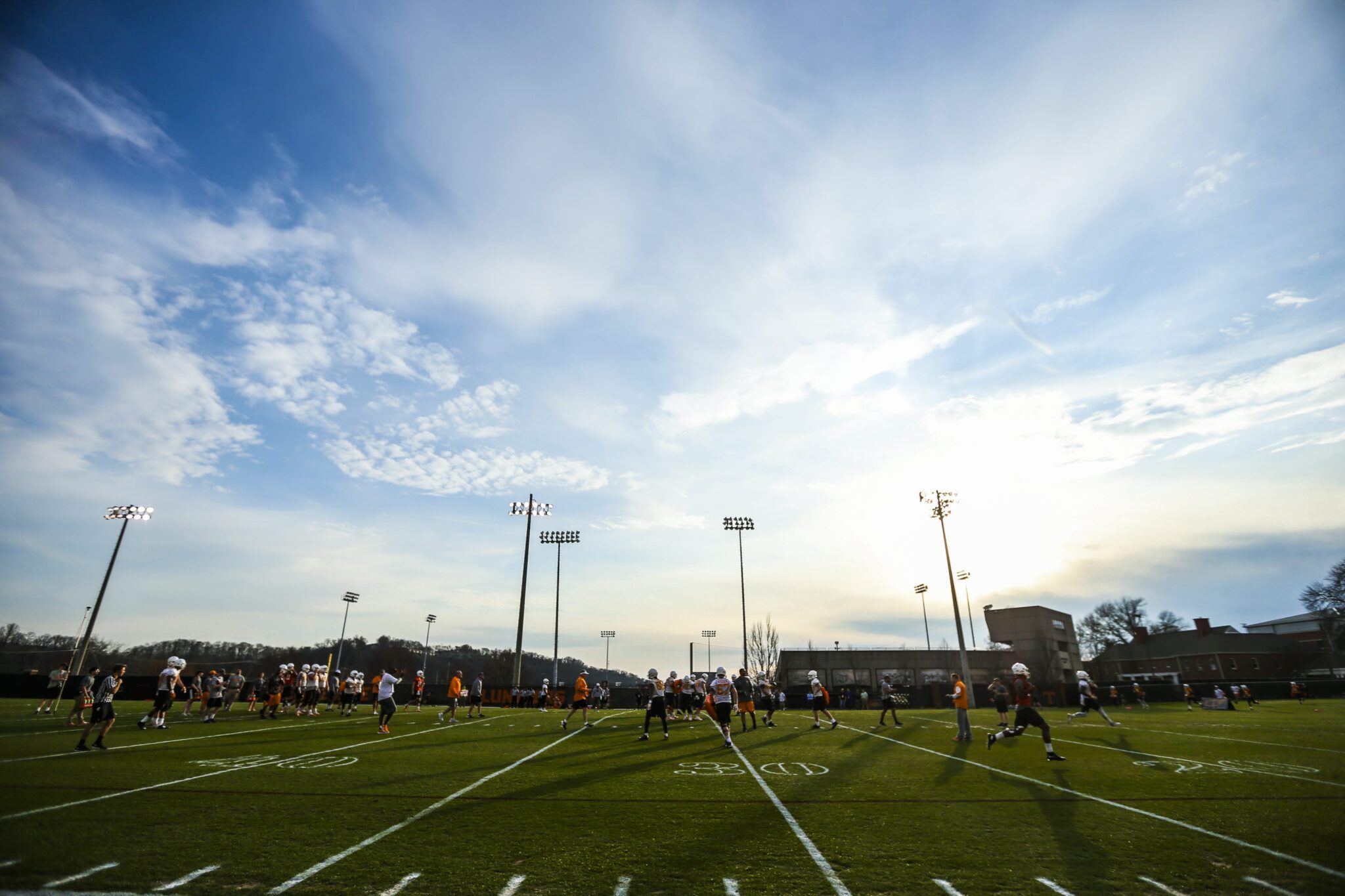Rocky Topics: Should UT settle its Title IX Lawsuit?
In this week’s installment of Rocky Topics, Dominic LoBianco and Morgan Sanchez discuss whether the University of Tennessee should settle the case or continue fighting.

KNOXVILLE,TN - MARCH 07, 2016 - The team practices during Spring Football practice in Knoxville, TN. Photo By Donald Page/Tennessee Athletics
[title_box title=”Rocky Topics: Should UT settle its Title IX Lawsuit?”]
Co-written by Morgan Sanchez
It has been almost a month since the civil suit was filed in Nashville against the University of Tennessee by six (now eight) Jane Does for violating the right guaranteed by Title IX of the Education Amendments Act of 1972, among other statutes. This week in Rocky Topics, staff writers Morgan Sanchez and Dominic LoBianco will debate if the university should settle this suit out of court.
LoBianco: First and foremost, I must establish that I am not a lawyer and I do not have an everlasting knowledge of state or federal statutes. With that being said, I have taken a few political science classes and I even aced my Judicial Policymaking class last fall so I fancy myself a bit of an expert. So, now that we are on the same page, I will say this; if the comments made by Dave Hart, Butch Jones, and the rest of the Tennessee coaches last week are true, I do not think there is any way the University of Tennessee should settle this lawsuit out of court.
Now, I know what you are thinking — this lawsuit is a public relations nightmare. The university is getting killed by media and the effectiveness of the campus administration’s leadership is being questioned by many people. However, after skimming through the original filing to the Middle District Court in Nashville, the 64-page document is riddled with holes that should prompt university lawyers to fight back. I’m not talking about point 142, where the plaintiffs cite “Third Down for What” as an enhancement of a hostile sexual environment. That is ludicrous on its own. For example, the law suit cites running back Jalen Hurd for an underage consumption charge he received last year. How does that pertain to the violations of Title IX in any capacity? There are additional citations for arrests of players like Coleman Thomas and Charles Mosley that seem to be thrown in there to paint an overall negative picture to the university in an attempt to force a settlement.
Sanchez: Unfortunately, I am not nearly as qualified to give my opinion on this case as Dominic is, but I like to think that I have a functioning head on my shoulders. Dominic makes a great point about some of the ridiculous points used as evidence in regards to the current case. However, the university should settle with the plaintiffs in order to avoid more attention and potential embarrassment to the institution.
A settlement is not the same thing as an admission of guilt, which is a possible outcome if the university decides to take this case to trial. The case appears to lack evidence in a lot of areas, and could almost certainly can be beaten by the university. However, court cases take a lot of time to progress through a trial, and the institution will be exposed to massive scrutiny from the national media. More Jane Does may be added to the lawsuit, and those cases might have more evidentiary support than the current plaintiffs. This is a virtual no-win situation for UT, because if this goes to trial, they will be painted as the bullies trying to let their athletes off the hook who call the victims liars. Even if the university does win the case, they will likely still be portrayed in a negative light by the national media.
LoBianco: I agree with Morgan on several points. If this case goes to trial and the university loses, the repercussions would be endless. But, with the plantiffs filing more amendments to their case, this case could take a year before it even makes it to court. That gives the public plenty of time to forget about all of the outcry. At this point, I think the only way that UT can genuinely clear its name is to fight the lawsuit in court. Morgan brings up a great point that a settlement does not mean an admission of guilt, but if the university settles, they will be slaughtered in the court of public opinion. Just look at the Florida State case involving Jameis Winston. Florida State paid Erica Winsman $950,000 out of court and received vicious scrutiny. With the Jane Doe count in UT’s lawsuit up to eight, you can imagine the size of the cash settlement. Also, I do not believe Dave Hart would address the media in the manner he did if the he felt the university could not win their case in court. Otherwise, it just adds fuel to the fire.
This lawsuit will continue to generate a lot of headlines because the allegation says that the administration is “promoting a hostile sexual environment”. However, that seems like too abstract of a concept to prove in court, especially when the athletic department has brought in several “guest experts” to educate players against destructive decisions. As a whole, the allegations appear damning — particularly when they are grouped together. If the university is able to break it down case-by-case in courtroom, I think they can have some success.
Sanchez: Dominic is correct in saying that Tennessee could very easily win this case, but my point is that they will be crucified by the media either way. We live in a guilty until proven innocent society now, and the result of the case is almost irrelevant in the eyes of the public. The damage that Dominic talked about, the scrutiny that the university would face if they settled, has already been done. The allegations have stained the university and given it a black eye. The best case verdict for Tennessee is that they aren’t found in violation of the Title IX regulations. This is not a criminal case where there is a guilty or not guilty. Tennessee will not be exonerated, and will still be associated with having a history of sexual assaults.
If the plaintiffs win, they will receive an even higher settlement than they would receive in an out-of-court settlement. It is also important to remember that the plaintiffs are also people and believe that they have been wronged. Several of the plaintiffs cannot bring criminal charges against the accused, so the purpose of the lawsuit is to make money. The other women have evidence that they were more than likely wronged and deserve some sort of settlement, but the success of this case is dependent on the success of every plaintiff involved. If the university wins this case by discrediting certain elements of the lawsuit, then these women will have gone through reliving their nightmare for no reason. It would be unfortunate for the innocent to be harmed in such a difficult case to handle. The university has the right to defend itself and the burden of proof is on the plaintiffs. I do not believe the plaintiffs can satisfy that burden of proof, and as a result, I do not believe they will win the case. However, it is a bad look for the university to carry this case any further. It would be wise to settle and let the past be the past.
I do believe that the system is broken. Schools should not be responsible for handling sexual assault cases because they aren’t capable of handling such a delicate and serious situation. As Clay Travis said, “You wouldn’t expect a university to investigate a murder or a bank robbery that happened on campus.” The sooner this case can be settled, the sooner people can move on and make changes to this broken system.
Featured image by Donald Page, courtesy of Tennessee Athletics
Edited by Nathan Odom and David Bradford
Dominic is in his second year writing on staff at TNJN. Along with being a staff writer, he also covers the UT men's basketball beat. He is currently a senior at the University of Tennessee majoring in Journalism and Electronic Media. Follow him @dominiclobianco on Twitter!




If you settle with extortionists, you invite extortionists to come and, well, extort you.
Don’t settle.